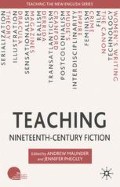Abstract
To grow up in the nineteenth century meant negotiating a culture that made gender the organizing principle of daily life, that divided work, education, clothes, colours, food, rooms, hobbies, even handwriting into male and female counterparts. Nineteenth-century women writers had a lifetime’s worth of work in engaging with the identity so insistently ascribed to them. So to teach courses on nineteenth-century women writers is not just to have a useful excuse for an Austen–Brontë–Eliot course (pleasant though that is); it is to read womanhood as it is constructed, contested, challenged, and reaffirmed, over decades and decades. It is to allow students to view marriage, patriarchy, motherhood, domestic management, illness, social networks, economic dependence, and political invisibility as the defining features of life. It is to inhabit a female character whose subjectivity misaligns with her culture’s dominant ideology, and to feel the mute desperation of having elements of one’s fundamental identity be unnameable and invisible. It is to imagine the point of view of the nineteenth-century female reader who wants her novel to offer a scenario of exhilarating escapism encased in a strong structure of reassuring convention. It is to try to imagine the labour of the female writer who needs to represent a complex lived reality within a language, and a culture, that did not easily accommodate it. To be a woman in the nineteenth-century meant, as Virginia Woolf noted, to be poor (1929, p. 28).
Access this chapter
Tax calculation will be finalised at checkout
Purchases are for personal use only
Preview
Unable to display preview. Download preview PDF.
Works cited
Brunton, Mary, Self-Control (London: Pandora Press, 1986. First pub. 1810/1811).
Corelli, Marie, Ardath (New York: H. M. Caldwell Co., n.d. but first edn. 1889).
Craik, Dinah Mulock, John Halifax, Gentleman (1856; New York and London: Harper Brothers, 1903).
Graff, Gerald, Beyond the Culture Wars: How Teaching the Conflicts Can Revitalize American Education (New York: W. W. Norton, 1993).
Hamilton, Susan, Criminals, Idiots, Women, and Minors: Victorian Writing By Women on Women (Ontario: Broadview Press, 2004).
Keen, Paul, Revolutions in Romantic Literature: An Anthology of Print Culture, 1780–1832 (Ontario: Broadview Press, 2004).
Moers, Ellen, Literary Women (London: Women’s Press, 1978).
Nelson, Carolyn Christensen, The New Woman Reader (Ontario: Broadview Press, 2000).
Oliphant, Margaret, Janet (London: Hurst, 1891).
Rumsey, Frances, Ascent (London: John Lane, 1923).
Steedman, Carolyn, Master and Servant: Love and Labour in the English Industrial Age (Cambridge: Cambridge University Press, 2007).
Sutherland, John, “Foreword: The Underread.” In The New Nineteenth Century: Feminist Readings of Underread Fiction. Ed. Barbarah Leah Harman and Susan Meyer (New York: Garland Publishing, 1996), pp. xi–xxv.
Warden, Florence, The House on the Marsh (New York: D. Appleton and Company, 1884).
Woolf, Virginia, A Room of One’s Own (New York: Harcourt Brace Jovanovich, Inc., 1929).
Editor information
Editors and Affiliations
Copyright information
© 2010 Talia Schaffer
About this chapter
Cite this chapter
Schaffer, T. (2010). Women’s Writing. In: Maunder, A., Phegley, J. (eds) Teaching Nineteenth-Century Fiction. Teaching the New English. Palgrave Macmillan, London. https://doi.org/10.1057/9780230281264_6
Download citation
DOI: https://doi.org/10.1057/9780230281264_6
Publisher Name: Palgrave Macmillan, London
Print ISBN: 978-0-230-53781-1
Online ISBN: 978-0-230-28126-4
eBook Packages: Palgrave Literature CollectionLiterature, Cultural and Media Studies (R0)

